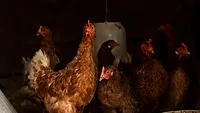Slaughter and DeLauro Highlight New Report Detailing Antibiotic Resistance in Foodborne Pathogens
WASHINGTON – Today, Congresswomen Louise M. Slaughter (D-NY) and Rosa L. DeLauro (D-CT) highlighted a report from the Center for Science in the Public Interest (CSPI) that detailed more than 55 foodborne illness outbreaks since 1973, and said the alarming compilation of evidence should compel federal regulators to fulfill their duty to protect public health from the growing threat of antibiotic-resistant bacteria in their food. Forty-eight of these 55 foodborne illnesses were caused by Salmonella. In 31 of these outbreaks, the bacteria were resistant to five or more antibiotics. In 2011 alone, three Salmonella outbreaks in turkey and beef sickened 168 and hospitalized 48 people.
“How many more outbreaks will it take before the USDA and the FDA take this problem seriously?” Slaughter said. “We have evidence that the practice of overusing antibiotics in food-animals is ruining these drugs’ effectiveness, and every day that the government stands idly by, we move closer to the nightmare scenario where routine infections can no longer be cured with antibiotic treatment.”
Congresswoman Slaughter, the only microbiologist elected to Congress, is the author of the Preservation of Antibiotics for Medical Treatment Act (PAMTA), which would require that eight major classes of antibiotics be banned from use on perfectly healthy livestock, while allowing exceptions to treat sick animals. According to the Food and Drug Administration (FDA), 80 percent of all antibiotics sold in the United States are sold for use in agriculture. A majority of these antibiotics are fed to perfectly healthy animals as a way to promote growth and compensate for raising them in crowded and unsanitary conditions. Already, antibiotic-resistant infections kill more than 70,000 Americans every year, and recently, researchers conclusively linked transmission of antibiotic-resistant bacteria from animals to humans, when they found genetically identical strains of MRSA infections in livestock and the farmers who raised them.
“It is clear that antibiotic-resistant strains of Salmonella present a very real risk to the public health,” Delauro said. “I urge the USDA to expeditiously review the petition that CSPI submitted more than two years ago and protect the public health from the clear risk of antibiotic-resistant foodborne pathogens.”
DeLauro is a former chairwoman of the subcommittee responsible for funding the Food and Drug Administration and the United States Department of Agriculture, and currently serves as a senior member of that committee. She is a cosponsor of the Preservation of Antibiotics for Medical Treatment Act. DeLauro is a longtime advocate for ensuring our food supply is safe and was one of the leaders responsible for passing the FDA Food Safety Modernization Act.
In May 2011, CSPI sent a petition to the USDA aimed at keeping antibiotic-resistant Salmonella out of the food supply. It has now been 2 years and USDA has not taken any action or responded to CSPI’s petition. Their petition is supported by 14 other public health groups – including Keep Antibiotics Working and the Johns Hopkins Center for a Livable Future. Specifically, CSPI asked that antibiotic resistant Salmonella be classified as “adulterants” due to the large number of foodborne illnesses caused by the bacteria. Classification of bacteria as “adulterants”, by law, requires the USDA to test for the presence of the bacteria in meat and remove any contaminated samples from the supply. This is currently standard practice for six dangerous strains of E. coli, but not antibiotic resistant Salmonella. Under current standards, USDA can only recall products contaminated with antibiotic resistant Salmonella after people get sick.
"Antibiotic resistance isn't a hypothetical problem," said CSPI food safety research associate Susan Vaughn Grooters. "Real people are getting really sick from antibiotic-resistant pathogens in our food supply."
"USDA ignores this issue at our collective peril," said CSPI senior food safety attorney Sarah Klein. "The evidence is clear that antibiotic-resistant pathogens in food are very dangerous for consumers, and USDA could help solve the problem by making crystal clear that it won't accept these superbugs in meat and poultry."
Looking for quick answers on food safety topics?
Try Ask FSM, our new smart AI search tool.
Ask FSM →






